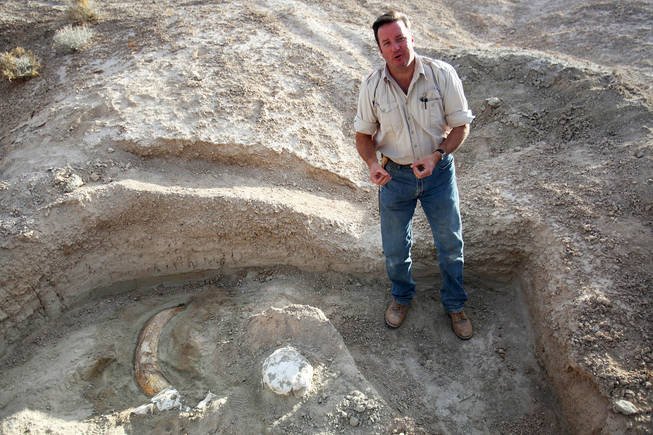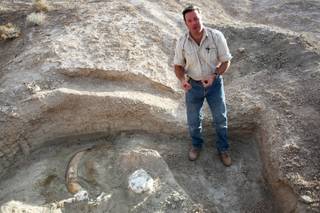
Eric Scott, a paleontologist from San Bernardino County Museum, talks Thursday, Dec. 2, 2010, about a partially unearthed Columbian Mammoth tusk in the proposed Tule Springs National Monument area in the north Las Vegas Valley.
Friday, Feb. 28, 2014 | 2 a.m.
Related stories
For more
For years, Nevada’s efforts to get public land bills passed through Congress have been stymied by a variety of politically charged differences.
For instance, there was the divide over whether Congress should create more wilderness areas — which Democrats, particularly Senate Majority Leader Harry Reid, have lobbied for, but House Republicans historically haven’t.
But now, Nevada’s premier pieces of public lands legislation are foundering before a far more prosaic hurdle: earmarks.
Republicans “believe there are limitations on what they can move forward, based on the rules in the House on earmarks,” Rep. Steven Horsford, D-Nev., said this week as the House Natural Resources Committee was scheduled to mark up his bill to declare a national monument at Tule Springs.
At the heart the bill are 22,650 acres of land on in the northern Las Vegas Valley that are home to some of the country’s oldest and best-preserved ice age fossils, including woolly mammoths, bison, dire wolves and saber-toothed cats.
By the time Horsford’s hearing rolled around, the bill had been pulled from the calendar, with the committee chairman citing “technical issues.”
It’s a phrase that has become a euphemism for philosophical disagreements in congressional politics. But for the Nevada bills’ proponents, it hardly makes a difference that the problems with the bills are technical. Adopting the proposed technical changes could bring down the crowning achievement of the Nevada public land management system.
Fifteen years ago, Reid and then-Sen. John Ensign negotiated the Southern Nevada Public Land Management Act. The system is complex, but basically it allows Nevada to put income from sales of federal public land toward other land conservation projects. A small percentage of the revenue also goes toward education and water resources in Nevada.
The legislation has allowed millions of dollars to flow toward improvement projects in Lake Tahoe, Lake Mead, Red Rock Canyon and other notable sites.
But Republicans argue that allowing profits of public land sales to go to a specialized fund in Nevada instead of the Treasury would count as an earmark — and under the current rules of the House, earmarks are no-nos.
This is the House rulebook definition of a congressional earmark: “A provision or report language included primarily at the request of a member … authorizing or recommending a specific amount of discretionary budget authority, credit authority or other spending authority … to a specific state, locality or congressional district, other than through a statutory or administrative formula-driven or competitive award process.”
Horsford’s direction in the Tule Springs bill that “the gross proceeds from the sale, lease or conveyance of land … shall be distributed in accordance with section 4(e) of the Southern Nevada Public Land Management Act of 1998” set off alarms and caused Republicans to propose directing those proceeds to “the general fund of the Treasury to reduce the federal deficit.”
Horsford said he thinks Republicans’ concerns with the bill are, as they say, technical.
“I take Chairman (Rob) Bishop, (R-Utah), at his word,” Horsford said. “We had a face-to-face discussion. He assured me that he wants to get to a place where we can try to move this bill forward with consensus on both sides.”
But other Nevadans who had been angling for the Tule Springs bill don’t see it the same way.
“Any attempt to support Tule Springs in this form is an attempt to gut (the land management act),” Reid said in a statement Wednesday, adding, “I will not allow nor support these efforts. A bad bill is worse than no bill at all.”
On Thursday, local Las Vegas leaders weighed in with their discontent.
“It is unconscionable that a bill resulting in Southern Nevada having a beautiful and well-deserved national monument is getting bogged down in politics and attempts to dismantle the Southern Nevada Public Land Management Act,” said Las Vegas Mayor Carolyn Goodman. “That’s not what the bill was intended to do. ... The committee should take up the original bill and move it forward immediately.”
The Tule Springs bill isn’t the first time an amendment to one of Horsford’s bills has contained legislation that threatens Nevada’s public lands system.
A few weeks ago, committee Republicans added similar language to the wilderness sections of a public lands package including Yerington, Wovoka Forest and Pine Forest.
Though that bill passed the House committee, signals from Reid were that the bill, as it emerged, would not stand much of a chance of passing the Senate.
The Republican amendment in Tule Springs’ case also proposes a study to determine whether the National Parks Service is the appropriate entity to manage the Tule Springs monument, once designated, and recommends changes in how proceeds from the transfer of Nellis Dunes land would be disbursed.
Horsford doesn’t think either complaint is justified, particularly the one pertaining to a request for another study. Local advocates for Tule Springs reviewed the transfer of land from the Bureau of Land Management to the Parks Service and determined it was the best-suited agency to take on management of a monument.
“The bill is about our local needs,” said Jill DeStefano, a founding member of Protectors of Tule Springs, one of the strongest advocates for the national monument. “It should stay that way.”
Horsford could not guess how long new discussions would take, and a spokeswoman for the Natural Resources Committee’s Republican majority did not return requests for interviews Wednesday and Thursday.
But Horsford said he’ll work with his Republican colleagues on the committee and with Reid in the Senate — where, Horsford noted, the rules on earmarks are different — to reach a conclusion on Tule Springs that everyone can live with.
“We live to fight another day in this business,” Horsford said, remarking on the bill’s delay. “It allows us ... to move the bill forward when it’s ready.”


Join the Discussion:
Check this out for a full explanation of our conversion to the LiveFyre commenting system and instructions on how to sign up for an account.
Full comments policy